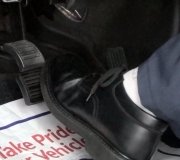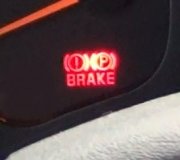Yup. You got what I meant by "working the lever". When you started to feel resistance is when the pistons came out far enough to contact the pads and rotors.
You might consider KHLow2008's suggestion about bleeding the ABS unit. Some vehicles require a scanner to activate some of the valves so the air can escape. This is particularly important if the master cylinder ran dry, or in your case, you replaced it. Here are a couple of tricks you might find useful in the future:
When the hydraulic system is opened, as in when replacing a caliper or brake line, fluid will drain out of the reservoir. If allowed to occur, you will have to bleed the system to the wheel you were working on and you may have to bleed other wheels too. To stop the fluid from draining out, use a stick from the seat to the brake pedal to hold the pedal down a couple of inches. The lip seals in the master cylinder will block the fluid from flowing while you do the work. When you're ready to bleed what you worked on, remove the stick, keep the reservoir at least half full, and gravity-bleed as necessary. Don't fill the reservoir to the top unless you have all new disc brake pads installed. If there are worn pads, you're going to have to push the pistons back in when you install new pads in the future and the fluid behind the pistons will go up to the reservoir and overflow creating a mess.
The second trick applies to replacing the master cylinder but only those that have two steel lines coming out, not four. Crack the soft metal nuts loose so you don't have to struggle with them after the master cylinder is unbolted from the booster. When it is off, use it as a lever to bend the steel lines upward just enough so the fluid doesn't run out. Do your normal bench-bleeding on the new one, then screw the two lines onto it. Finger tight is sufficient. Use the master cylinder to bend the lines back down, then install it to the booster. Loosen the nuts just a little, then have a helper press the brake pedal very slowly so it takes about 10 seconds to go half way to the floor. You'll see air bubbles come out by the line nuts. Snug them up before your helper releases the brake pedal. The pedal should be allowed to pop back quickly. By pressing it slowly, any air bubbles in the lines will tend to stay where they are or they will float back up. By releasing the pedal quickly, the fluid rushing back up will wash the air bubbles up into the reservoir. This will prevent you from having to bleed at the wheels.
Tuesday, March 16th, 2021 AT 11:51 AM
(Merged)



